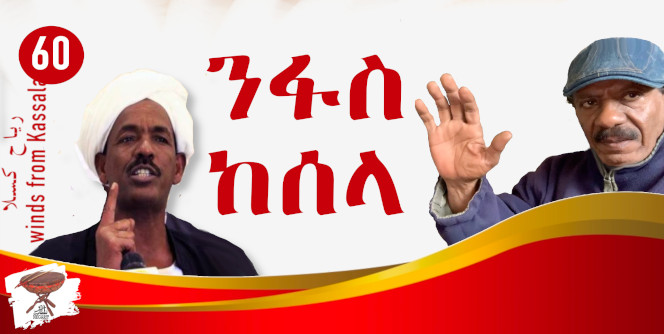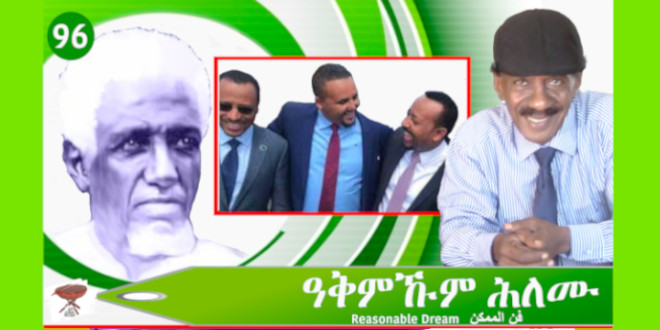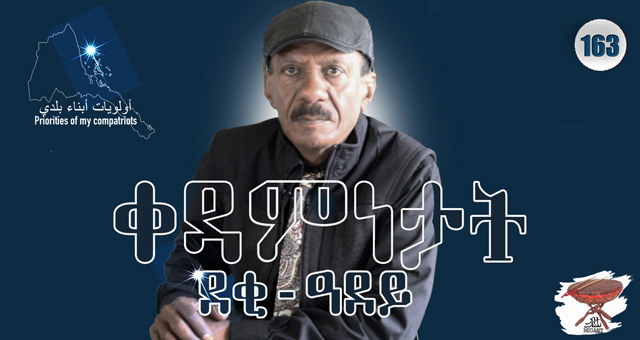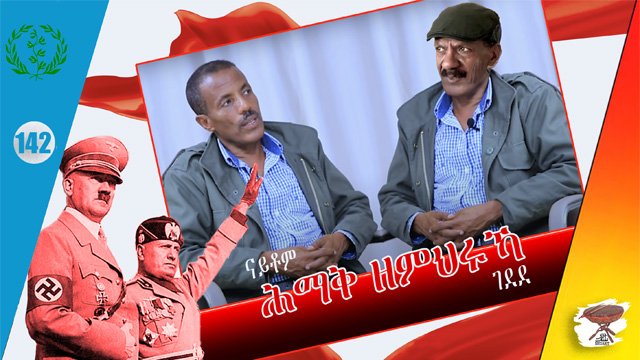Negarit 60: ንፋስ ከሰላ – رياح كسلا – winds from Kassala

Created with GIMP
This is the script of Negarit 60, and the English translation of the Arabic speech in Kessela, Sudan.
The aftermath of The Sudanese revolution that overthrew Al Bashir’s government is manifested in post regime change haggling among Sudanese political and social groups. What transpires in Sudan is believed to be very significant to Eritrea, and that’s why they are following what’s happening in Eastern Sudan diligently
A few months ago, the first short-lived small scale ethnic disturbances were ignited in in places like Girba; months later similar disturbances happened in Port Sudan and inflicted considerable damage on lives and properties. But it seems the popular leaders are maturing and the demands are becoming clearer. Members of the tribes that straddle the border areas between Sudan and Eritrea are also becoming assertive and are demanding full rights and freedoms centered around identity.
It’s in such instances that pragmatic leaders might break the ice and thus, the result of the current movement in Eastern Sudan is unpredictable.
Both the Sudanese central government and the PFDJ regime of Eritrea could use the situation to their benefit and could derail the legitimate issues that could result in a catastrophe. On the other hand, the stakeholders might be wise enough not to play with fire and handle the issue with the needed maturity and sophistication. But for whatever it is worth, Eritrean justice seekers should follow the situation in Eastern Sudan diligently and lend their support to the legitimate demand for rights of the many citizens in the region.
It should be clear that eastern Sudan is full of victims of the successive tyrants who tormented the region, and still are. The victims, mainly refugees who have been neglected for over half a century, need the attention and solidarity of Eritrean justice seekers.
To illustrate what’s happening in the Kassala region, I will present you a public speech delivered by Alamin Daoud the Secretary General of the United Popular Front for Liberation and Justice, and the Political Secretary of the Sudanese Revolutionary Front. At the end of the speech, the presenter concludes the event with an arousing prose, recognizing many villages and hamlets in the border-area, followed by a poem recited with a mix of Arabic and Tigrayit languages.
———-
[Though] guests have their dignified places, my greetings to my people and kin, the dignified and prideful people, people of generosity, and to the people of Kassala. Greetings to you all, greetings to all residents of the [Eastern/Kessela] region (Sharq). The Eastern region is considered a smaller [representation] of Sudan.
Please allow me, to offer a special greeting to my people and kins: Sellumam! Ekubam! Keho’llekum?
Furthermore, I do not want to keep you for too long under the scorching sun, but I would like to tell you the accomplishment of the United Popular Front for Liberation and Justice.
the United Popular Front for Liberation and Justice is a main component of the Sudanese Revolutionary Front which managed, through efforts, sacrifices, and through struggles, under the leadership of Ustaz Alamin Daoud Mahmoud, and managed to establish a separate platform, with a separate path, distinct from the other negotiation platform that the Sudanese Revolutionary Front is pursuing [and conducting] with the Sudanese Government.
Now, oh people of the Sharq, you have a separate path. But what are the issues of the Sharq? It’s a separate path for the Sharq? The issues of the Sharq, are the shortest (simplest) issues in Sudan.
In the outset, we need to resolve, for you and for us, in a clear and frank manner, the problem of identity–the problem of the Sudanese identity. And we are border-area tribes [in an area] extending from Eritrea to Sudan. And it’s not an insult, or belittling to hold an Eritrean passport, because I carry it with a legitimate right… and an acquired right. We are one people in two states, it’s the colonizers who divided us, without our wishes. The Italian and English colonizer divided us without our consent. And the proof of that is, in this region, when ideological and political differences appeared, between the ideologies of Khartoum and the ideologies of Asmara, war was ignited on the border-area but it was an ideal war. A war where no genocide happened. A war which was not between villages—like what happened in other parts of Sudan.
That is because, the component here (in Sudan) and there (in Eritrea) is one component. We want to establish our right to the Eritrean identity–that we are border-area tribes, and we have the right to enjoy the Eritrean identity, with a legitimate right, just like we have the right to carry a Sudanese identity, with an acquired right.
And this is not a belittling … we want our rights. We have rights and we have obligations. We cannot be asked to perform our obligation before we assure our rights. To begin with, we want what is ours. We want to live respectfully with pride–in Sharq Sudan. We do not want anyone to tell us ‘this one comes from there, and that is from here.’ We want the issue to be resolved legally, with the preservation of our Sudanese rights, without anything affecting it.
We have a legacy, we have traditions, and we have cultures that we will preserve, we will never surrender our rights.
We weigh, we respect, and we share all the capabilities of Sharq AlSudan. Whoever lived in Eastern Sudan, has equal rights to administer Eastern Sudan with us. But we direct the attention of all, that we are identified by our ideal generosity. And our slogan that attests to it is, “Oh our guest, if you visit us in our homes, you would find out that we will be like your guests and you become our host.” But, and again but, this generosity should not be understood improperly. This generosity should be understood only in a proper manner.
As for our issues regarding development, and our issues in construction, it can be more clearly stated, [our region] has suffered and is still suffering. As a simple illustration, we are now [witnessing] that the government has built a dam on the Setit River. But instead of the Setit river benefiting the region, it has become a burden to the region. Why? The Setit dam, which was supposed to serve agriculture and provide power, the Setit river dam has not provided neither agricultural benefits nor power supply—the canal that should have run to the North to irrigate the land is not dug, and also the canal that should have run to the south to irrigate the south, is not dug. So, for whose benefit is the dam storing the water? We in Eastern Sudan must benefit from the dam. And we in the United Popular Front for Liberation and Justice, regarding the negotiation issues, we have comprehensive files named Land and Dam.
We want to resolve the issue of land. We want the rights of the land to return to its owners. It’s not conceivable for someone to own 50,000, 60,000, or 70, 000 feddan (1 to 0.420 hectares), while the surrounding villages suffer from [lack of land]. The villages do not have a plot of land to farm. How was the land granted? It was granted from the center [federal government]. There will not be a center that controls our lands [anymore]. There will not be again a center, that controls our resources. We want true federalism. Financial federalism. Only our surplus goes to the center. And the weak regions, can be helped by the wealthy regions. We want a genuine federalism, a financial federalism, in order to enjoy benefits from our land and enjoy our finances. And there should not be someone deciding on our behalf.
From now on, we in the region, want a complete administration [of our region], without anyone being in charge of our affairs. From today on, we will not accept anyone but ourselves to take charge of our issues. And from now on we will not accept anyone to dominate us except ourselves. Therefore, we came to you, to present to you, an explanation, and confirm to you that we have come here, and we want to rectify our situation.
We are not seeking positions of authority. We do not want power. We want to resolve the problems of our people. And our peoples’ problems can be resolved through dialogue. And if we fail in the dialogue, we will try all other means to achieve our rights. Of course, we will start with dialogue, but if we do not get responses, we are on our way to escalate the matter. However, if we get responses, [we will say] “may Allah prevent believers from infighting (Kefa Allah almoumineen sher al-Qital)
I do not want to keep you any longer, and we will discuss with you this case file– we will make arrangements for that—there could be more speakers on the wait, and the sun is hot, and we are more concerned with your health than with speeches. Assalam Wealeikum weraHmatu Allah Weberekathu.
[THE PRESENTER…}
Ustaz Alamin Daoud the Secretary general of, United Popular Front for Liberation and Justice, and Political Secretary of the Sudanese Revolutionary Front…….
I recognize the villages of Gulsa, WedSherifey, Ad Mussa, Tikyay, Awad, alMarya, Ad Seydna, Ad key, Um Seferi, Dimen, Bagadir, Hafert, Ammara, bstotya, Al Lafa, fatouk, AsebAt Halfa Jedida, Aderman, Khesm Algirba, 26, Shegerab, and Gash its high Kebessa, and Barka, Tehatu Qedamit.




Awate Forum